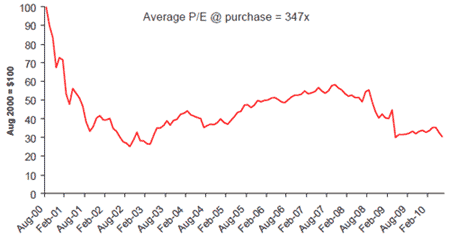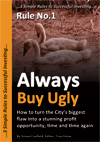The worst investment mistake you can make
Falling in love with popular stocks is a mistake that even professional investors make. But they are almost always overbought and overvalued. The way for a private investor to beat the City is to buy stocks trading below their true value. Simon Caufield explains how to find them.
Get the latest financial news, insights and expert analysis from our award-winning MoneyWeek team, to help you understand what really matters when it comes to your finances.
You are now subscribed
Your newsletter sign-up was successful
Want to add more newsletters?

Twice daily
MoneyWeek
Get the latest financial news, insights and expert analysis from our award-winning MoneyWeek team, to help you understand what really matters when it comes to your finances.

Four times a week
Look After My Bills
Sign up to our free money-saving newsletter, filled with the latest news and expert advice to help you find the best tips and deals for managing your bills. Start saving today!
What do you think of Fortune magazine? To me, it's the magazine that rich people read. And what's the most important financial goal for rich people? Of course, it's to stay rich after inflation.
So when, ten years ago on 14 August 2000, Fortune put together a list of "ten stocks to last the decade", it should have been worth reading. The magazine predicted: "a few major trends will likely shape the next ten years. Here's a buy-and-forget portfolio to capitalize on them".
Well, had you bought the portfolio, you would certainly wish to forget about it, as we'll see in a moment. And there's a vital lesson that you can learn from this.
MoneyWeek
Subscribe to MoneyWeek today and get your first six magazine issues absolutely FREE

Sign up to Money Morning
Don't miss the latest investment and personal finances news, market analysis, plus money-saving tips with our free twice-daily newsletter
Don't miss the latest investment and personal finances news, market analysis, plus money-saving tips with our free twice-daily newsletter
Buy and forget you'll wish you had
The ten stocks tipped by Fortune as "buy and forget" stocks, were Broadcom, Enron, Genentech, Morgan Stanley, Nokia, Nortel, Oracle, Schwab, Univision and Viacom.
And they'd have lost you 70% of your money over the decade, as the chart below shows.
Fortune Magazine's ten stocks to last the decade

Source: GMO, Bloomberg, Datastream
Now you may think I'm being wise after the event. But the fact is that Fortune fell victim to the worst investment mistake you can make: that is falling in love with growth.
Every one of the ten companies operated in markets with huge potential growth. Wireless communications, broadband, internet equipment, business software, biotechnology and entertainment were set to change the world. Each company was growing sales very fast. Their prospects looked limitless.
The trouble is, every investor on the planet knew it. So the stocks were hugely popular and very expensive. The average price / earnings ratio on 14 August 2000 was 347. So even if they grew profits ten times, it was still going to take them 35 years to repay your investment.
Even professional investors chase expensive stocks
Why does this happen? Well, it starts because human beings aren't programmed to deal with uncertainty. We're naturally overconfident. For example, 82% of us think we are above average drivers. Almost all investors believe their returns will be better than average. I could go on and on.
So when we like a stock, we are certain it's a good buy. That means popular stocks are almost always overbought, and overvalued. They've been on a tear and you think they're going to make you rich. The truth is they're more like lottery tickets lousy investments. But we play because we just can't resist the dream.
Even professional money managers make the same mistake. Their worst nightmare is clients taking away their money. That's how money managers lose their job. So how do they prevent it? They own the same stocks as everyone else. They own the stocks they think you want them to hold. Then there's no reason for a client to switch.
Imagine you are a fund manager trying to explain to your irate investors why you don't own Apple, for example, when it's quadrupled since March 2009. Even if you think it's wildly overvalued, you have to own it. If you don't and then you underperform the market, you're history.
On the other hand, underperform the market by owning the same stocks as everyone else and you'll survive. This is why fund managers think it's OK to lose your money just as long as the other fund managers are doing it too.
The crucial truth that most investors don't get
Professor Ben Graham, the inventor of value investing, never paid for growth. He distrusted growth companies so much that he developed a way to value stocks based on assets and current earnings. He factored in nothing for future growth. And many people me included believe Graham to be the most successful investor ever.
He saw a truth that most investors simply don't get.
Professors Elroy Dimson, Paul Marsh and Mike Staunton at London Business School have now proved what Graham knew. And it's this
Fast-growing companies don't generally deliver better returns than slow-growing ones.
Stocks in fast-growing emerging markets haven't beaten slower-growing developed markets over the long run. It's as if growth has no value. How can this be?
Well, investors forget that growth is not free - growth requires investment. At a bare minimum, a growing company needs more working capital;many will require more space and equipment; and some might need to boost research and development to keep the growth going. These all need investment - and they cost.
So growth is valuable only for a few special companies. They are businesses that reinvest profits to deliver returns that are higher than their cost of capital. And these types of companies attract competition. Just look at the huge number of electronics companies rushing to bring out tablet computers to compete against the Apple iPad.
Only companies that can defend their markets against competition are able to maintain profit margins and growth in the long run. And that's rare. In the last ten years, the world leader in mobile phones has changed from Motorola to Nokia to Research in Motion (Blackberry) to Apple. Every time someone brings out a better phone, customers switch. Do you really think Apple is going to be able to keep bringing out better phones than the competition for ever?
The best way for a private investor to beat the City
So be very careful about growth. Companies like Apple, Arm Holdings, Amazon and Netflix may be great companies, but at current prices, they're almost certainly not great stocks. They're just too expensive. They're lottery tickets.
Instead you need to be looking for the exact opposite of a lottery ticket. And what's that? It's a stock trading at below its true value.

In fact, I feel strongly that you should be able to easily beat the City professionals using this strategy. And I'd like to show you how.
I've written three free reports onThree Simple Rules to Successful Investing. I'd be delighted if you read them, and I think you'll find them very interesting. They're free and yours to keep. My first report, Always Buy Ugly, is available here and you can read it right now.
And in the next few weeks I'll be telling you all about a stock which I believe fits the bill perfectly.
This article originally stated that the Fortune list of stocks was published in 2001. However, it was published in 2000. This has now been amended.
This article is taken from our free daily email, Money Morning. Sign up to Money Morning here to receive intelligent investment advice every weekday.
Our recommended article for today
Harvest bumper profits from agriculture
As the global population rises and climate change begins to bite, improvements in agricultural methods are needed to feed an increasingly hungry world. James McKeigue looks at the farming industry, and picks the best investments to buy now.
Get the latest financial news, insights and expert analysis from our award-winning MoneyWeek team, to help you understand what really matters when it comes to your finances.
Simon Caufield started out as an engineer and has an MA in engineering from Cambridge. This was followed by an MBA from the London Business School.
After graduating, Simon worked his way up to become a Management Consultant for banks and insurance companies. This gave him the chance to see the city from the inside.
In 2001, Simon started his own company to develop software designed to price banking services, such as loans and deposits. After growing the company to 100 employees, he went on to sell this in 2007, looking for his next challenge.
Also during 2007, Simon ‘sacked’ his fund managers and took complete control over his investments. Now he devotes all his time to investing and is an angel investor to help start-up companies. He has built up a reputable 20 years in the industry.
Simon writes his own investment newsletter – True Value. This follows the strategy he established in 2007 and is based on assets that are priced way below their true value. He scours the worldwide markets for equities, bonds and alternative investments to find opportunities that fit his conservative and contrarian approach.
-
 How a ‘great view’ from your home can boost its value by 35%
How a ‘great view’ from your home can boost its value by 35%A house that comes with a picturesque backdrop could add tens of thousands of pounds to its asking price – but how does each region compare?
-
 What is a care fees annuity and how much does it cost?
What is a care fees annuity and how much does it cost?How we will be cared for in our later years – and how much we are willing to pay for it – are conversations best had as early as possible. One option to cover the cost is a care fees annuity. We look at the pros and cons.